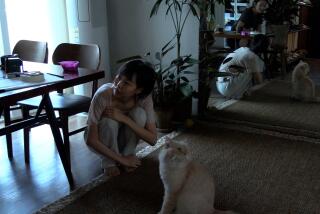Justin Chon’s Koreatown-set ‘Ms. Purple’ relies heavily on mood
- Share via
Justin Chon’s 2017 directorial debut “Gook,” set in the highly charged atmosphere of the 1992 L.A. riots, had the urgent air of someone speaking out and showing off. If it seemed erratic at times in its mix of temperament and style, one could peg it to the emotions of its besieged, searching, marginalized figures, and chalk it up to a first-time director’s belief in the magnetic power of unruliness.
That approach, though, wears thin when applied to Chon’s second feature, “Ms. Purple,” once more examining the Korean American experience in L.A. through the eyes of young strugglers, this time between an estranged Koreatown sister and brother taking care of their dying father in the house where they were raised. Even with an ostensibly more delicate scenario than a community literally ablaze, Chon’s eagerness to treat emotions like ready-made fires gets in the way of the intended weight and textured beauty of his drama.
From the start, Kasie (Tiffany Chu) is a compelling case study in how traditional patriarchal affection can warp a daughter’s expectations of the adult masculine world. After a childhood prologue in which a doting single dad (James Kang) calls her his “beautiful princess,” we’re introduced to the Kasie of today: disheveled and stumbling through the hazy morning streets after what we soon learn is a regular night for her in Koreatown’s private-room karaoke clubs as a paid companion to pleasure-seeking, often-violent men.
The money she makes — including from a rich “boyfriend” (Ronnie Kim) who gives her envelopes of cash — goes straight into caring for her now-comatose father. But when the longtime home nurse quits, Kasie refuses to put her dad in hospice care, turning instead to wayward brother Carey (Teddy Lee) for help. Carey’s sense of duty, however, is more toward his reconnecting sister, because their dad, in the wake of their mother’s abandonment of the family, always favored Kasie. His nursing methods might be unconventional — wheeling his unconscious father out into busy city streets — but it’s also his version of the quality time he never got before.
“Ms. Purple” is unapologetically a mood piece, told primarily from Kasie’s viewpoint as a woman whose sense of security is a tug of war between a familiar rut and longed-for escape. But it’s a psychology grabbed in bits and pieces from Chon’s overreliance on silent, gazing faces in needle-drop-scored montage, rather than from layered exchanges that might reveal more nuance. And when his characters do speak, there’s a manufactured overheatedness to the dialogue, a vision of human interaction that spikes all too easily. A scene of Kasie aggressively approaching nurses in a parking lot for help before being hauled away by security, for example, plays more like a shortcut to intensity than an organic character shading.
That preference for quickly cued bursts over seeded drama is a regrettable hole in what Chon and co-screenwriter Chris Dinh have otherwise artfully, sensitively set up, because the contours of the siblings’ waking life are sharpened well by the performances — notably Chu’s brew of bitterness and innocence — and Ante Cheng’s lustrous L.A. cinematography, which swerves hypnotically between the city’s night vibrancy and daytime malaise. And while overplayed, a motif of palm trees as lonely, picturesque (and metaphoric) totems against the backdrop of Kasie’s wounded rootlessness better serves Chon’s belief in the power of visual signposts than his fondness for that bane of indie agitation: the shaky camera.
If you think of second features as pitfalls of either sameness or overreach, Chon’s “Ms. Purple” is more curious than most in that it feels like an alluring mixture of the two, a family story with artistic ambitions that’s tone-conscious to a fault, but rarely chord-rich.
'Ms. Purple'
Not rated
Running time: 1 hour, 27 minutes
Playing: Landmark Nuart, West Los Angeles
More to Read
Only good movies
Get the Indie Focus newsletter, Mark Olsen's weekly guide to the world of cinema.
You may occasionally receive promotional content from the Los Angeles Times.










